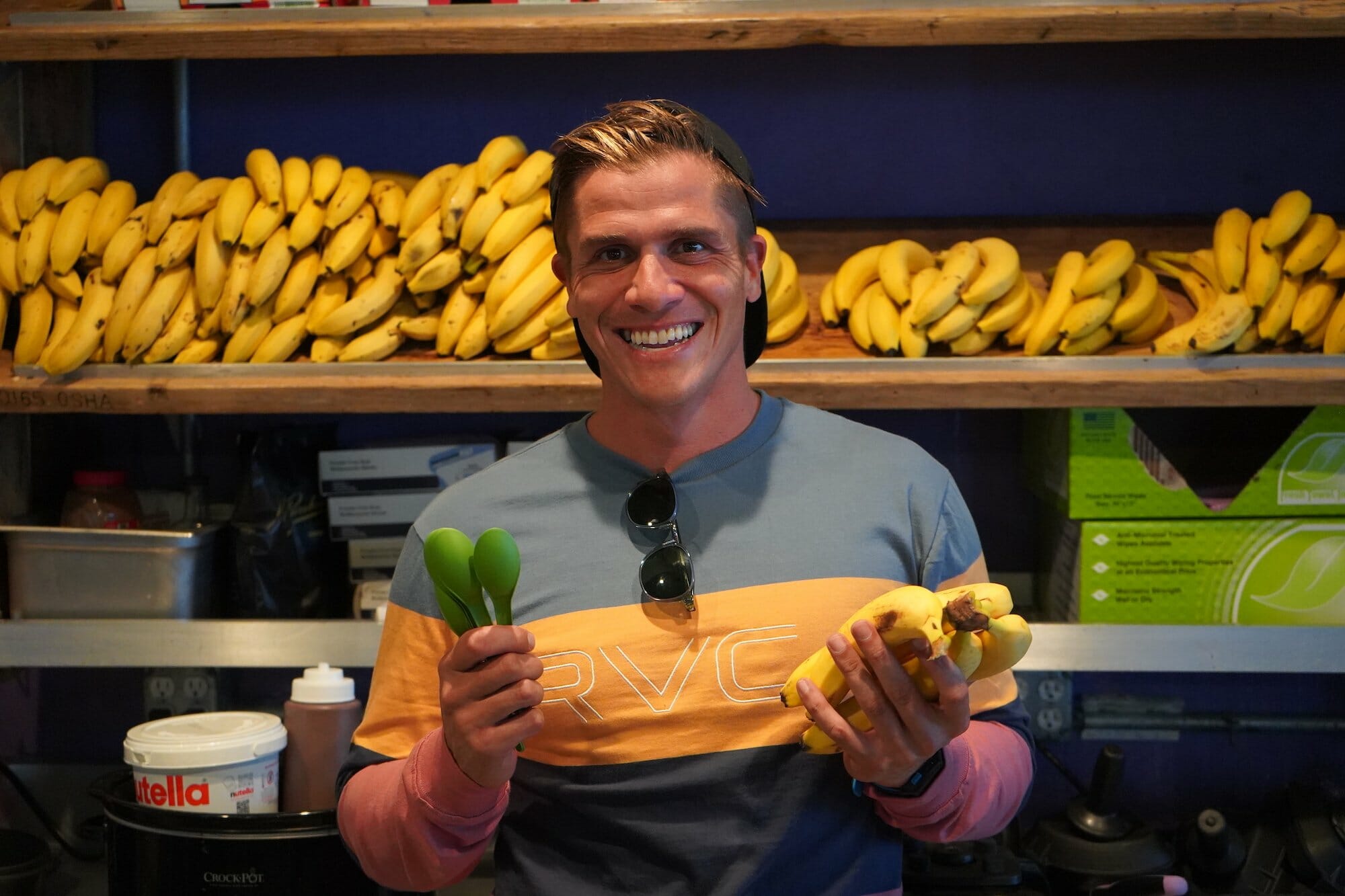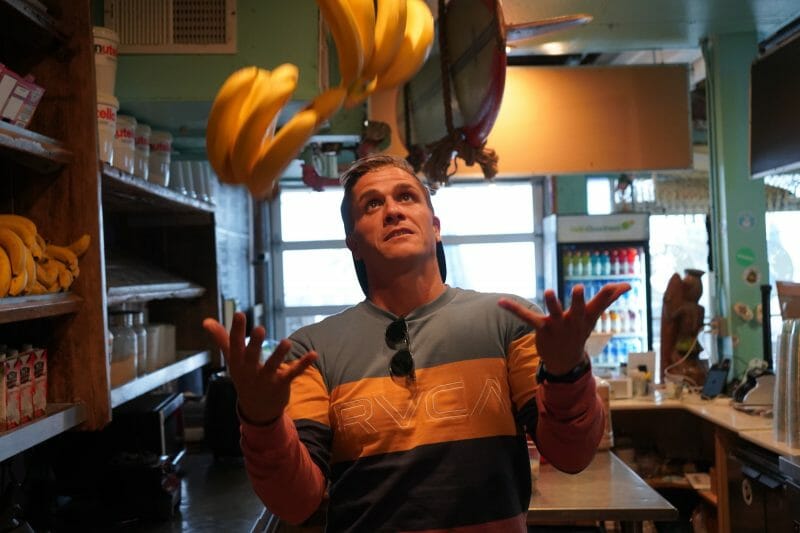
Most people know me as the founder and CEO of Playa Bowls. And over at the Wegmans of Ocean Township, I’m pretty sure they still call me Banana Boy. I’ll come back to that later…
First, let’s talk about the color green. In business, green is the color that makes the world go round. It’s also been said that green is the root of all evil. Green also happens to be the color of a banana that’s not quite ready to eat.
We all know that a green banana is gross. Even if it’s just a little bit green, that banana is still hard and slimy. Now try to imagine the logistics of running a business that serves thousands of bananas every single day. Over the past five years, I’ve driven countless miles and spent untold sums of money just to make sure that no banana ever touches a Playa Bowl until it’s absolutely perfectly ripe.
And keep in mind that only a few short years ago, the major food distributors didn’t take us seriously. Even back in 2015, when our flagship Belmar store hit the ground running, most wholesalers looked at us like we were total kooks. I needed bright yellow bananas by the hundreds, and they’d toss boxes of dark green at my feet like they were doing me a favor.
Some people would say that a green banana is good enough. But good enough has absolutely nothing in common with great food. So back then, if we got stuck with green bunches, I had to zigzag around food stores and produce stands and big box stores buying up yellow bananas like an OCD freak.
There were times I hit Wegman’s four or five times in the same day. And that’s how I came to be known as Banana Boy. Imagine a single mom trying to buy a loaf of bread, while I’m at the front of the line with nine boxes of bananas and a palette of granola. “Oh great, look who’s back, here comes Banana Boy again…”

Needless to say, I got into some big shouting matches. Back then, I just couldn’t understand why a major grocery store would refuse to sell their whole entire stock of bananas to one single customer. I guess I was a total kook, because I didn’t even realize that I was screwing up the inventory rates for some poor produce manager. I just knew that I needed all the yellow bananas I could find to keep my own business going.
And since I couldn’t afford to let any bananas go to waste, the green bunches wound up all over my apartment, stacked in pyramid foundation, while my roommates were just trying to go about their lives. (Pyramid formation, by the way, is the best way to oxidize your bananas, and you have to constantly rotate the pyramid.)
This is back when my little Ocean Avenue apartment was storage, supply, and base of operations for all things Playa Bowls. We were three people sharing 1500 square feet, and it was all covered in granola and produce. My roommate Cassie literally sprained her ankle trying to climb over a box of bananas. And once I discovered that 74 degrees is the ideal temperature for bananas to ripen, everyone was constantly complaining that the apartment was too warm.
Fast-forward to 2019. Tramontano Produce, one of our three main food distributors, just upgraded to a 40,000 square foot warehouse with $2.5 million of Playa Bowls inventory. Three whole rooms are devoted to circulating bananas through the ripening process. This is our way of ensuring that a box of green bananas never lands in one of our kitchens again.
I believe that you can draw a straight line right from that old apartment to the brand new warehouse. Because I know that if I had ever chopped up and served a green banana just to save myself another humiliating trip to the grocery store, we wouldn’t be here today.
Green also happens to be the color of our spoons, at every one of our 78 locations. Those spoons are made in America from biodegradable plant-based material, and they cost us exactly four and a half cents on the wholesale market.
Now, here’s a peek behind the financial curtain: For the past few years, I’ve had literally dozens of suppliers in my ear, promising to save me thousands of dollars. Because for one penny each, we could be using black spoons that are made in China. Changing one little detail could save us 78% on a big inventory item. Makes sense, right?
Wrong. Here’s why I would never do that: Right from the beginning, I had a feeling about those little green spoons. Green is a color that represents good health and environmental sustainability, and I always believed that our customers would make that connection.
The point is, when you’re trying to promote health and sustainability, the little details aren’t so little. If we started using non-biodegradable Chinese materials just to save a buck, we wouldn’t be walking the walk. We’d be our competitors.
Yeah, I’m gonna throw a little shade here. Just like you, I’ve watched some pop-up competitors try to mimic our look and our menu. But over and over again, I’ve watched those competitors cheap out on the little details, and it always catches up to them. Here’s one way to know what you’re getting: When you see a restaurant using cheap, generic bowls and spoons, then you know they’re also cheaping out where it matters the most: The quality of ingredients.
And that brings me back to our green spoons. In case you’re wondering, for the year 2019, we’re going to use about four million of them. And yes, I’ve done the math. In theory, Playa Bowls could switch over to black Chinese-made spoons and save about $140,000. Again, that’s in theory.
But here’s the problem with that theory: All of those black spoons would wind up in a landfill, and that would be one less detail separating us from the lesser quality of our competition. At the end of the day, it’s the little details that define your brand. Something as small as a green spoon or a yellow banana might cost a few extra cents, but it can make the difference between your bottom line being black or red. So to the future entrepreneurs of the world, don’t ever assume that saving a buck behind the curtain is good for business.
And finally, to everybody who walks through our doors: Thank you, as always, for your business and your feedback. I know that you know the difference between a good enough product and a truly great product. I know that our success and our future is exactly like that little green spoon. It’s not in my hands.
It’s in yours.
Rob Giuliani is the co-founder and CEO of Playa Bowls. In partnership with co-founder Abby Taylor, the company has grown to over 75+ locations nationwide and over $50M in revenue in less than five years. This is the fourth installment of a regular column that explores the Playa Bowls business story in all its glory. Be sure to check back each month for updates to the Playa Chronicles.
© 2026 Playa Bowls. All Rights Reserved. “Playa Bowls” is a registered trademark of Playa Bowls, LLC. “Welcome to Pineappleland” is a trademark of Playa Bowls IP LLC. Playa Rewards is a Registered Trademark of Playa Bowls IP, LLC.